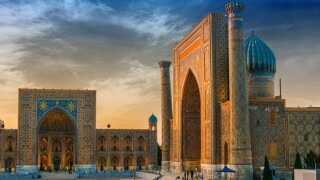Middle East Bonds
-
Saudi Arabia has secured an export financing agreement with Korea’s export credit agency and trade insurance corporation. The deal, which will bolster trade between the two, is the kingdom’s second ECA-backed deal.
-
Junk-rated emerging market sovereigns Benin and Oman sold bonds this week, with market participants saying their new issue premiums were minimal. However, bankers think total activity across CEEMEA over the last two weeks has been “underwhelming”.
-
The Sultanate of Oman's return to debt markets is proof to some that the market is wide open for high yielding emerging market issuers. The sovereign mandated banks for a dollar deal as investors, hunting for yield, appear undeterred by volatility in the US rates market.
-
A burst of mandates on Monday confirmed what many market participants had expected: a rise in emerging market corporate bond supply.
-
The blockade imposed on Qatar by its Gulf neighbours in 2017 was lifted this week, with a gradual easing of all restrictions expected in the coming months. However, bankers and investors are skeptical that the move's "short-lived" effects will have a significant impact on regional capital markets, which have demonstrated resilience in recent years.
-
Emerging markets issuers of all flavours ignored convention and stormed into primary bond markets this week, with great success. Renewed warnings about increasing debt ratios in emerging nations were no match for an extraordinarily supportive technical picture as investors piled into deals — even as Democratic victories in US Senate run-offs pushed rates higher. Mariam Meskin and Oliver West report.
-
Diversification has taken hold in central Asia's Uzbekistan, which over the last two years has started its pivot towards international capital markets. According to sources, a plethora of debut deals is expected to hit markets in coming months.
-
The Gulf region has fared well this year, despite the double impact of the coronavirus pandemic and the drop in oil prices, according to Dr Jarmo Kotilaine, chief planning and monitoring officer at Bahrain’s Tamkeen and author of Trials of Resilience: How Covid-19 is driving economic change in the Arab Gulf. Kotilaine believes an expansion of capital markets activity in the region will be a key driver of economic growth in 2021.
-
With returns on developed market bonds being squeezed as never before, debt analysts are heralding emerging markets as the place for investors to be in 2021. Yet the faster the global economic recovery, the more vulnerable EM fixed income will be to what has often been its downfall: any signal of tighter global liquidity conditions, write Mariam Meskin and Oliver West.
-
Emerging market bond mandates are continuing into the last month of the year, despite expectations that activity would quieten down after a jam-packed year of issuance. Kuwait’s Burgan Bank and Montenegro are among some of the CEEMEA issuers seeking to take advantage of unfalteringly attractive credit conditions.
-
Fifty year bonds caught the attention of issuers and investors alike across CEEMEA, especially the Middle East, this year. That will continue in 2021, but investors are not ready to flash their cash indiscriminately.









